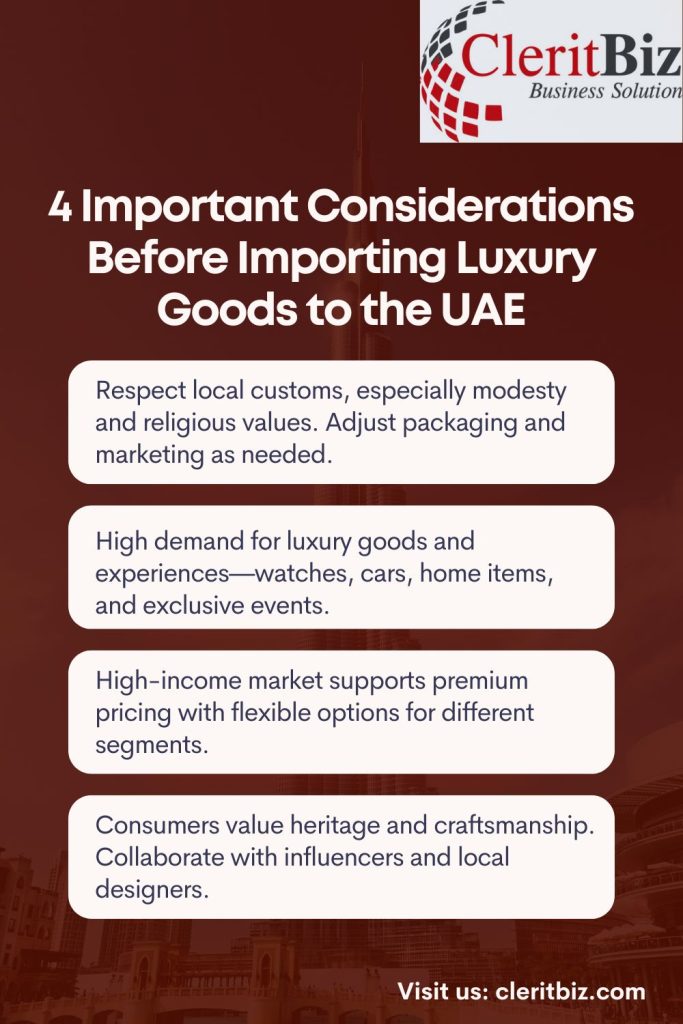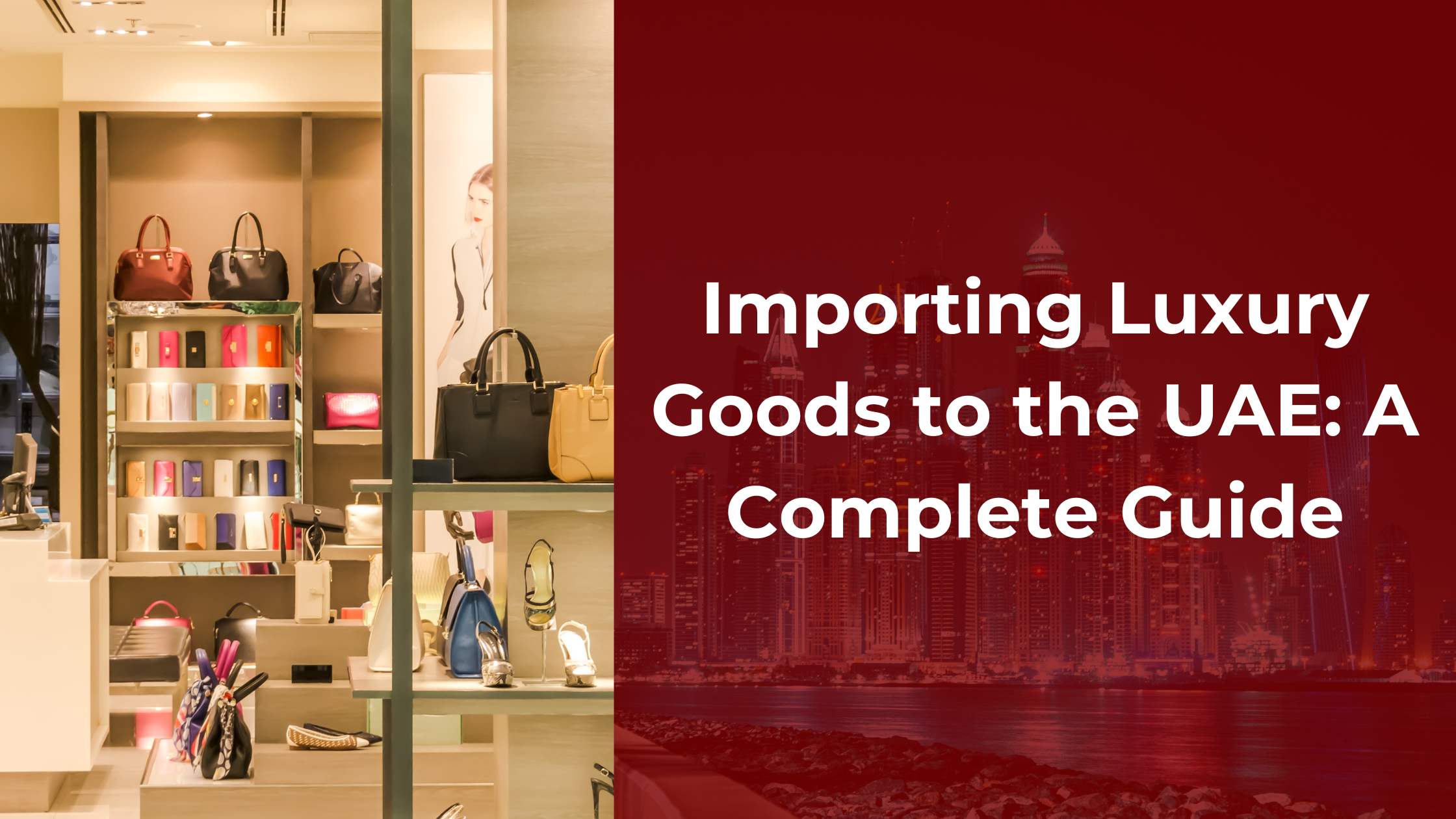The UAE’s luxury market has experienced steep growth in recent years. Though the import of luxury goods already had a long history, it came to notice in the late 20th century. Early imports included silk from China and India, cashmere from Central Asia, fine cotton from Egypt and India, and precious stones like rubies, sapphires, and emeralds from India, Sri Lanka, and Africa. For entrepreneurs considering business setup in Dubai, the current trends reveal that the UAE is home to some of the world’s most prestigious luxury brands, offering everything from high-class fashion to supercars. According to Mordor Intelligence, the UAE luxury goods market is projected to reach $5.39 billion by 2029, expanding at a CAGR of 5.20% from 2024 to 2029.
In this blog you will learn about the current market trends, how you can import, and what are the key considerations to look out for before importing.
UAE’s Current Luxury Goods Market
The UAE has established itself as a global hub for luxury goods. The UAE, particularly Dubai is the global epicenter for luxury goods. The main reasons for it being the center for luxury goods are due to its geographic location(situated at the crossroads of Europe, Asia, and Africa), tax-free shopping, government support, investment, etc.
Also, another reason for the UAE being the center for luxury products is the diverse population(200 nationalities). A population that demands a wide range of top-class products. These expensive merchandise include fashion, accessories, automobiles, watches, jewelry, etc. The products are often associated with luxury brands such as Gucci, Louis Vuitton, and Chanel. Luxury car brands include Ferrari and Lamborghini.
Overall, the UAE’s luxury goods market is self-sustained for continued growth and evolution. Products such as luxury accessories, high-performance vehicles, premium watches, precious stones, etc are likely to evolve.
How to Import Luxury Goods to the UAE
Importing luxury goods to the UAE involves a well-structured process that ensures compliance with the country’s regulations. Here are the key steps:
Understanding UAE’s Import Regulations: Familiarize yourself with the UAE’s import regulations, which include requirements for product labeling, customs duties, and documentation.
The UAE imposes a 5% import duty on most luxury goods, with higher rates for specific items like alcohol (50%) and cigarettes (100%). Additionally, products must adhere to strict quality and safety standards set by the Emirates Authority for Standardization and Metrology (ESMA).
Registering with the UAE Customs: Companies looking to import luxury goods must register with the UAE Customs. This involves obtaining an import code, which allows you to bring goods into the country. The registration process involves providing detailed information about the company, its business activities, and the types of goods to be imported. It’s crucial to have a valid trade license to complete this process.
In 2023, the UAE Customs processed more than 26.5 million import declarations, highlighting the volume of trade activity in the country.
Choosing the Right Logistics Partner: Selecting a reliable logistics partner is essential for the smooth transportation of luxury goods. Consider a logistics provider with experience in handling high-value items and knowledge of the UAE market.
The luxury goods market in the UAE is highly competitive, and efficient logistics can significantly impact delivery times and product conditions. It’s estimated that the UAE’s logistics sector contributes approximately 14% to its GDP.
Customs Clearance Process: Work with your logistics partner to ensure that all necessary documentation is in place for customs clearance. This includes invoices, certificates of origin, and any required permits.
Customs clearance can be a complex process for luxury goods due to their high value and potential for fraudulent items. On average, customs clearance for high-value goods can take 2-3 days.
Distribution and Retail Channels: Once the goods have cleared customs, plan for their distribution and sale. Whether through retail stores, boutiques, or online platforms, ensure that the products reach the target audience effectively.
In terms of Distribution and Retail Channels, luxury e-commerce, particularly the online market has been on the rise exponentially over the past few years.
4 Important Considerations Before Importing Luxury Goods to the UAE

Cultural Sensitivity: The UAE is a predominantly Muslim country with a diverse population. Luxury goods should respect local customs and values, especially regarding modesty and religious sensitivities. For instance, swimwear and lingerie might require specific packaging or marketing approaches.
Market Demand: While high-end fashion, watches, and jewelry are popular, there’s a growing demand for luxury experiences like personalized services, exclusive events, and after-sales care. The UAE’s affluent population also shows interest in luxury home goods, electronics, and automobiles.
Pricing Strategy: The average household income in the UAE is high, allowing for premium pricing. However, competitive pressures and consumer expectations need to be balanced. Additionally, consider offering different price tiers to cater to various consumer segments.
Brand Reputation: Luxury consumers in the UAE value difference, heritage, and craftsmanship. Building a strong brand presence through public relations, social media, and partnerships with local influencers can significantly impact sales. Consider collaborations with local designers or charities to enhance brand image.
The UAE’s luxury goods market presents many opportunities for businesses looking to expand their reach. Businesses should take advantage of the opportunities—high consumer demand, diverse product range, tax-free shopping, etc. Moreover, with the market projected to grow steadily in the coming years, now is an ideal time to take a look at the potential of importing luxury goods to the UAE. Also, by understanding the market dynamics, complying with import regulations, and considering key factors such as cultural sensitivity and brand reputation, you can successfully navigate the process and tap into this profitable market.

